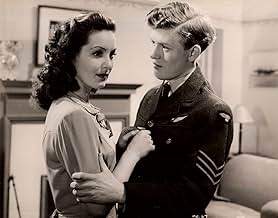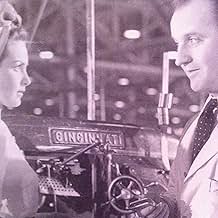Adicionar um enredo no seu idiomaA young woman called into service at a factory during World War II falls in love with a member of the RAF.A young woman called into service at a factory during World War II falls in love with a member of the RAF.A young woman called into service at a factory during World War II falls in love with a member of the RAF.
- Direção
- Roteiristas
- Artistas
- Mrs. Blythe
- (as Amy Vaness)
- Mrs. Hammond
- (não creditado)
- Brenda - Worker at the Factory
- (não creditado)
- Direção
- Roteiristas
- Elenco e equipe completos
- Produção, bilheteria e muito mais no IMDbPro
Avaliações em destaque
Although it is clearly a propaganda film in essence, this wartime drama is quite interesting for not being as simplistic as some of its peers. In this family drama we don't really have a message pushed that hard but are instead left to draw out own warmth from a narrative that has a surprising amount about class within it. In this regard it does produce some interesting threads although those looking back for sharp comment will not find it because this is still a melodrama with a propaganda edge. As such it is a bit plodding at times but I still quite enjoyed it for what it was although I can understand why some viewers have found it a bit dull and lacking in sharpness.
The cast are pretty good with the material. Roc and Dunn give good if unspectacular turns as the daughters while Marriott provides a working class comic relief to proceedings as the father. Te support cast features good work from Jackson, Crawford and others but the performances are not as good as I would have liked just because the script doesn't cut as deep as it could have although perhaps understandably so.
Overall then a solid wartime melodrama with the heavy propaganda scaled back to allow for a more natural and convincing story delivered with solid turns. Aside from the touch of class politics there isn't that much to set the screen on fire but it should make good as a matinée on a weekend afternoon sort of thing.
Ditto 'Millions Like Us' by another talented duo. Launder and Gilliat, well established as scriptwriters, ventured into feature direction (the only time they took a joint credit) with this episodic and fascinating study of life on the home front.
It centres on the long, dull hiatus between the Blitz and invasion scares of 1940 and the forthcoming relief of D-Day in 1944. The propaganda purpose was to rededicate civilians who were becoming bored with the seeming stalemate: Hitler no longer menacing us, we not yet able to take the war to his camp. Women were targeted for morale-boosting. The film aimed to convince these 'millions' that their conscription into factories, often seen as unglamorous by comparison with uniformed service alongside the fighting men, was essential for victory.
Thus Patricia Roc, the shy home-keeping daughter of a domineering working class widower, dreams amusingly of heroics as a nurse or airwoman, and dreads being called up for industrial work on a production line in a strange town. But she makes friends, is good at her work, marries a nice flight-sergeant in the Royal Air Force and endures the vicissitudes that follow. Other girls from widely different social backgrounds muck in and do likewise.
So much for the uplift. Rarely has a pill been so deftly sugared, however. The scene-setting in the widower's house is an index of the film's almost obsessive determination to avoid overt uplift.
Rumours of war on the wireless are exchanged for dance music on the other channel. Patriotism does not visibly improve among the younger generation once hostilities begin. One daughter is man-mad, entertaining the troops not wisely but too well; another whose husband is serving in the Western Desert is a lazy, grumbling, neglectful mother. The old dad (Moore Marriott, gruff and unrecognisable as the antic dotard of the Will Hay classics) does his bit in the Home Guard but moans inconsolably about being 'deserted' by his daughters when the country whisks them away.
At the factory a socialite drafted to turn a lathe strikes up an uneasy friendship with her gruff northern supervisor; but he tells her she'll never be better than mediocre at the work, that she might not be good enough for his proletarian family and that he isn't ready to propose to her because they may be too different. "Ooh aye, ooh aye" she mockingly replies. This brilliantly crisp little exchange seems in retrospect to predict the bombshell Labour victory of 1945, when the people of the 'People's War' gave the upper crust its quittance and the rising technocratic class took control.
Laced with verite footage of crowds at play at the seaside or entering and leaving factories, the film plays like a fictionalised version of Humphrey Jennings's 'Spare Time' and 'Listen to Britain'-- with perhaps a conscious homage in the canteen community singing of the moving final episode. And through it runs the music of Beethoven, as if to acknowledge that the enemy has his good points: here it anticipates another Jennings classic, 'A Diary for Timothy'.
The acting, especially in the home sequences, is low-key in the same manner as Lean's 'This Happy Breed'. A far cry from the stagey histrionics of pre-war British cinema, it anticipates the naturalism of TV drama. There are no big speeches or characters, just commonplace folk muddling through. The interpolation of Naunton and Wayne, whom L&G had made a crosstalk team in 'The Lady Vanishes', is the only concession to a 1930s conception of entertainment.
Miss Roc, torn between father, duty and the dream of a domestic life, is a credible symbol of young British womanhood. Recent research, contrary to earlier feminist assertions, has established that most women were both glad to escape the parental home to aid the war effort, yet were not reluctant to become housewives once the fighting men returned. In this and other ways 'Millions Like Us' has a ring of truth absent from histrionic efforts such as Selznick's 'Since You Went Away' and retrospective looks at Riveting Rosies such as Demme's 'Swing Shift'.
That such a presentation could be achieved while the dilemmas were being experienced, and under the auspices of a government fighting total war, is a huge tribute to the integrity of the British film-making community. It remains a quietly, gradually engrossing pleasure to watch.
This movie is part love story and part propaganda-flic. The propaganda elements are more subtle than in many 40s films eg 'The Next of Kin'. However the life of the factory girl is glamourized. This is Celia's escape from the domestic drudgery of caring for her elderly father and allows her to find true love. Also the togetherness of the factory girls is emphasised throughout the film. The contrast between shots of Celia demure and alone that we see at the start of the film and the final scene of her as an integral part of the group is marked. Not only is munitions work vital to the war effort, we are being told, but it also provides companionship, an outlet and fulfillment for women.
A film about and for women in the workplace may sound like a step forward from the usual patriarchal portrayal of the female sex. Yet, at its heart this is a deeply conservative film. Ultimately Celia finds fulfillment with and through a man and whilst the companionship of women is important, all the female characters are searching for a husband.
However, the Directors should be applauded for having done a good job in making an enjoyable, informative propaganda film.
By the way, look out for the shots of Patricia Roc's feet when she is talking to her husband. Is this an erotic charge or fear of chilblains? Watch the movie and let us know what you think.
The cast is fine - Patricia Roc and Gordon Jackson headline as Celia and Fred, with Anne Crawford as Jenny and Eric Portman as down-to-earth foreman Charlie. There's also a bit for Radford and Wayne to do (an amusing scene where their travelling soldiers in a railway carriage get overrun with evacuees). Megs Jenkins also plays Gwen with some style and pathos. Patriotic hokum it may be, but I like the foregrounding it gives to the women (especially Jenny, who I quite like by the end of it) and the respect it gives to the factory girls and what they did for their country.
It is also unusual for the era in its unabashed portrayal of young women as actively sexual beings with a healthy, even predatory, interest in men. The sole - and glaring - exception to this model is the central heroine, Celia. Patricia Roc's portrayal of her is so overwhelmingly timid, self-effacing and prudish, it comes as little less than miraculous that she manages to bag Fred: a young Airman in the shape of Gordon Jackson. Mind you, he's no firebrand either: together, they make an infuriatingly ineffectual couple.
Far more interesting is the spiky relationship of social opposites Jennifer (Anne Crawford) - privileged/haughty/indolent - and no-nonsense factory foreman Charlie (Eric Portman). In this pair's uneasy mutual attraction and verbal sparring we see echoes of Shakespeare's Beatrice & Benedick.
N.B.: Watch out for a lovely cameo by Irene Handl as the newlyweds' landlady.
Você sabia?
- CuriosidadesGrandpa Jim comments that his daughter Phyllis has progressed from dating "local lads" to "the United Nations." Interestingly, although the international organization with that name did not exist until two years after the film's release, the term "United Nations' was used to describe the allied forces arrayed against the Axis Powers. FDR used the term frequently.
- Erros de gravaçãoAlthough Fred Blake (Gordon Jackson) is flight crew on a Short Stirling (the type of aircraft Celia makes parts for and which is seen being towed out of the factory), there are at least two shots of Fred's aircraft taking off/climbing which are actually an Avro Lancaster.
- Citações
Charlie: You can't cook or sew, I doubt if you can even knit. You know nothing about life, not what I call life. You're still only a moderate hand on a milling machine and if you had to fend for yourself in the midst of plenty you'd die of starvation. Those are only your bad points. I'm not saying you haven't got any good ones.
Jennifer: You're mighty generous Mr Forbes. As for you, you've no looks, you're old fashioned, morbidly suspicious, dull, and your pipe makes horrible bubbly noises.
- Cenas durante ou pós-créditosOpening credits --- over archive footage: NOTE: The orange is a spherical pulpish fruit of reddish-yellow color.
- ConexõesFeatured in The Unforgettable Gordon Jackson (2012)
- Trilhas sonorasSymphony No. 5 in C minor, Op. 67
(uncredited)
Music by Ludwig van Beethoven
Played over main titles and later in the score
Principais escolhas
- How long is Millions Like Us?Fornecido pela Alexa
Detalhes
- Tempo de duração
- 1 h 43 min(103 min)
- Cor
- Proporção
- 1.37 : 1


































